Technology Systems
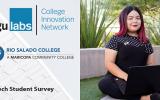
In August of 2020, Rio Salado College became a founding partner of the College Innovation Network (CIN), which was designed to connect leaders from colleges and universities with EdTech innovators to advance students’ academic, career, and life outcomes (Flores, 2020). In August 2021, CIN, an initiative spearheaded by WGU Labs, published the results of a multi-institution survey aimed at understanding students’ learning experiences with education technology (EdTech) during the 2020-2021 academic year.
The New Digital Divide: How EdTech Self-Efficacy is Shaping the Online Student Learning...

In March 2020, as the world became drastically different due to the COVID-19 pandemic, educational institutions found themselves pivoting to remote operations, quarantine, and technology-enabled strategies for working and learning. At SAIT, a polytechnic in Western Canada, actions to ensure the techno-resiliency of instructors were taken through innovative use of a community of practice (CoP) model and a digital learning exchange, which have proven to be effective in empowering postsecondary educators to master this difficult transition. We have learned that CoPs can also be used to advance...
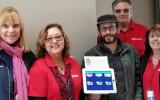
Students in the Mesa Community College (MCC) Everyone Can Code iOS Apple App Development program decided that a joint project was a perfect opportunity to put their knowledge to use. The outcome? The Resource Information Services for Everyone (RISE) app.
The development team of faculty and nine students from advanced and introductory classes were assigned roles that highlighted their skills. The team researched the existing app market, developed a plan, and began developing a proof of concept. Initially, the app contained helpful markers for on-campus resources such as registration,...
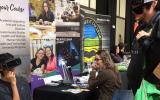
If a picture is worth a thousand words, then a virtual reality (VR) tour must be worth a million. Portage College has seven campus locations throughout northeastern Alberta, a vast rural region in which it is difficult to provide potential students an on-location experience. Since one of the primary ways an individual chooses a college is by visiting it, we decided if students can’t get to us due to distance and travel time, why not bring it to them?
Portage College produced a 360 VR tour video to show potential students our campuses, program labs, and local areas. The Corporate...
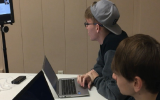
Marlie Burt was 75 miles away from fellow classmates when she worked on a group project last semester. Burt, who lives in La Harpe, Illinois, and attends classes at Carl Sandburg College’s branch campus in Carthage, collaborated with her classmates via a telepresence robot located on the Main Campus in Galesburg, where the other students in her police administration and management course met.
Burt attended the class by controlling the robot—affectionately named Sheldon, after The Big Bang Theory character—while sitting at a computer station at the branch campus. With Sheldon, distance was no...
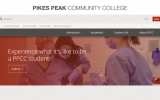
Pikes Peak Community College’s (PPCC) website was in sad shape. Designed in 2010, it was not mobile first, its navigation confusing, and the feedback from students and others universally negative.
In May 2015, a four-person PPCC marketing team decided to take on a redesign in partnership with the IT department. The first question team members asked themselves as they designed the new website was: Who is our primary audience? But finding an answer to that question was tougher than they expected. PPCC, like other community colleges, has many audiences: faculty, staff, students, prospective...
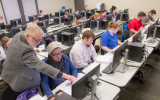
The computer hacking of major corporations, government offices, and banks is a growing threat. Dozens of high profile cases in the news recently highlight the issue, but there is a solution: cyber defense. Companies across the world are expanding and refining their security systems. Volunteer State Community College (Vol State) in Gallatin, Tennessee, is responding to the need for cyber defense expertise with a new degree concentration as part of a rapidly growing realm of information technology education being offered at the college. The reason for the expansion is based on employment...
July










